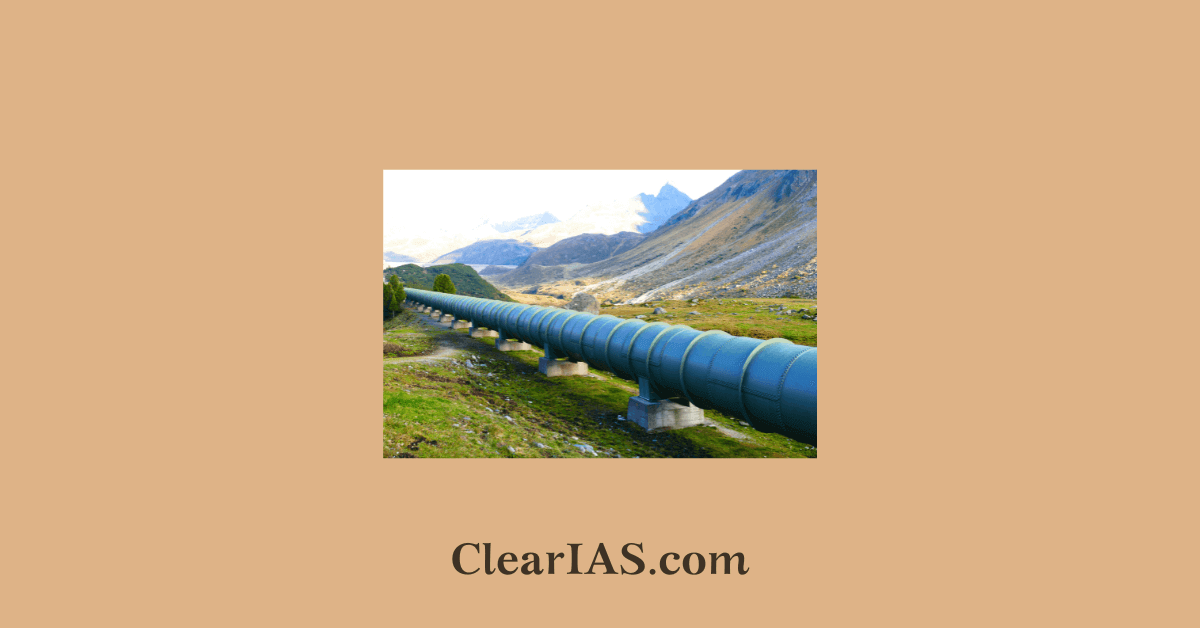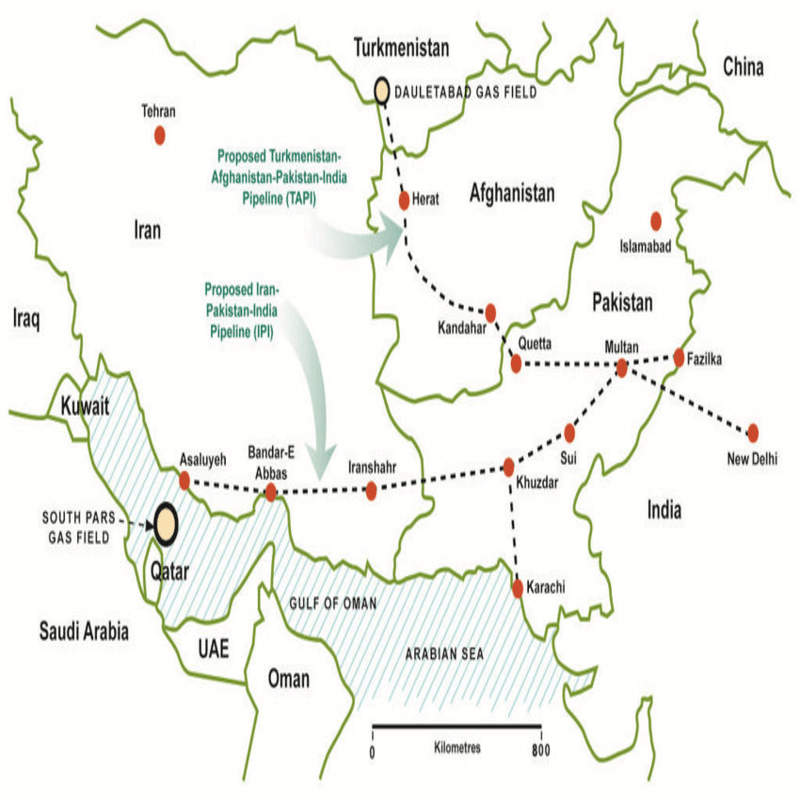
The TAPI pipeline (Turkmenistan-Afghanistan-Pakistan-India) project is a significant regional initiative designed to transport natural gas from the Galkynysh gas field in Turkmenistan, one of the largest gas fields globally. Read here to learn more.
The pipeline is expected to deliver around 33 billion cubic meters of natural gas annually, spanning 1,814 kilometres across four countries: Turkmenistan, Afghanistan, Pakistan, and India.
Afghanistan recently announced plans to begin construction of the pipeline, a crucial step in the project, which has been delayed due to political instability and security concerns.
Here are key aspects related to the TAPI pipeline project.
Key Features of the TAPI Pipeline

- Gas Source: The pipeline will transport natural gas from the Galkynysh gas field in Turkmenistan, a massive energy reserve.
- Route: The pipeline will pass through Herat and Kandahar in Afghanistan, entering Pakistan through Quetta and eventually reaching Fazilka in India.
- Annual Capacity: The pipeline aims to transport 33 billion cubic meters of natural gas per year.
- Economic Impact: The project is expected to provide financial benefits and job opportunities in the region, especially in Afghanistan and Pakistan. It could also enhance regional cooperation and energy security.
- Security and Political Challenges: Security concerns, particularly in Afghanistan, have been one of the primary obstacles to the project’s progress. However, recent developments suggest renewed commitment from stakeholders to address these challenges.
Project Overview:
- Length: Approximately 1,814 km.
- Capacity: Designed to transport around 33 billion cubic meters (BCM) of natural gas annually.
- Route: Starting from Turkmenistan, the pipeline traverses Afghanistan (Herat and Kandahar provinces), Pakistan (Quetta and Multan), and ends at Fazilka in northern India.
Key Players:
- Turkmenistan: Primary gas supplier, with the Galkynysh field holding one of the world’s largest gas reserves.
- Afghanistan, Pakistan, and India: Major transit and consumer countries, with India expected to receive about 38% of the gas.
- Asian Development Bank (ADB): Primary financial backer for the project.
Strategic Importance
- Energy Security: The pipeline is crucial for India and Pakistan to secure energy supplies, reduce reliance on Middle Eastern oil, and diversify their energy mix.
- Regional Cooperation: It fosters cooperation among the four countries, particularly India and Pakistan, which have historically difficult relations.
- Economic Benefits: The project promises economic benefits for Afghanistan, which would receive transit fees and investment, potentially aiding its development and stabilization.
Significance of the TAPI Pipeline
- Environmental Impact:
- Cleaner Alternative: The TAPI pipeline presents a cleaner alternative to coal. For countries like India, which rely heavily on coal, transitioning to natural gas can significantly reduce CO2 emissions and help meet international climate commitments such as the Net-Zero Emissions Target.
- Air Quality Improvement: Major urban centres, including Delhi, Mumbai, Karachi, and Islamabad, could see a reduction in air pollution due to decreased coal usage and increased access to cleaner natural gas.
- Economic Benefits:
- Energy Security: For India, the pipeline offers an important opportunity to diversify energy sources and reduce its dependence on coal and more polluting forms of energy.
- Economic Growth for Transit Countries: Afghanistan and Pakistan stand to gain economically through transit fees, employment opportunities, and regional infrastructure development. It also has the potential to encourage investments in renewable energy sources.
Challenges Regarding the TAPI Pipeline
- Security Concerns:
- Afghanistan Instability: The pipeline’s route through Afghanistan raises significant concerns, as the country faces political instability, insurgent activities, and humanitarian crises. Ensuring the security of the pipeline in this context is a substantial challenge.
- Financing and Administration:
- Funding Gaps: While the Asian Development Bank (ADB) has committed to support the project, most of the funding must come from private investors, which is challenging due to the region’s instability and high risks.
- Complex Administration: The involvement of four countries, each with its administrative systems, complicates project management and smooth implementation.
- Investment Climate:
- Turkmenistan’s Closed Economy: Turkmenistan’s relatively isolated economy, combined with issues such as corruption and weak governance, makes it difficult to attract the level of investment needed for a project of this scale.
- India-Pakistan Tensions:
- Political Obstacles: Given the historical tensions between India and Pakistan, there are concerns over the long-term cooperation needed for the pipeline’s success. Political disagreements could delay or even halt progress.
- Environmental Concerns:
- Natural Gas Impact: While natural gas is a cleaner alternative to coal, it still poses environmental risks. The extraction process, including fracking, can lead to water contamination, soil degradation, and even seismic activity. Additionally, natural gas, though cleaner than coal, is still a fossil fuel that contributes to greenhouse gas emissions.
In the news
The project has faced numerous delays due to security concerns, geopolitical tensions, and financial difficulties. However, efforts to push forward continue, with construction in some regions, such as Turkmenistan, already started.
- Afghanistan said work would begin on a $10 billion gas pipeline traversing South Asia as officials joined dignitaries in neighbouring Turkmenistan to celebrate its completion on that side of the border.
Conclusion
The TAPI pipeline, once operational, has the potential to transform regional energy dynamics and foster greater economic cooperation across South and Central Asia.
While the TAPI Pipeline promises significant environmental, economic, and strategic benefits, its success hinges on resolving substantial challenges, including security issues in Afghanistan, funding, and the political tensions between India and Pakistan.
Frequently Asked Questions (FAQs)
Q. What is the status of the TAPI project?
Ans: The project has been completed in Turkmenistan. Afghanistan has stated that work would begin in August 2024.
Q. Who is funding the TAPI pipeline?
Ans: The TAPI Pipeline Investment Agreement was signed in April 2016 by TPCL and the Asian Development Bank, with the latter providing initial funding of $12 million for the pipeline.
Q. Which companies are involved in the TAPI pipeline?
Ans: Stationed in Dubai, TAPI Pipeline Company Limited (TPCL) was incorporated on 11 Nov 2014 by member countries to build, own and operate the project. Turkmen-Gas, Afghan Gas Enterprise, Inter-State Gas System Private Limited and GAIL of India own its shares.
Related articles:
-Article by Swathi Satish






Leave a Reply